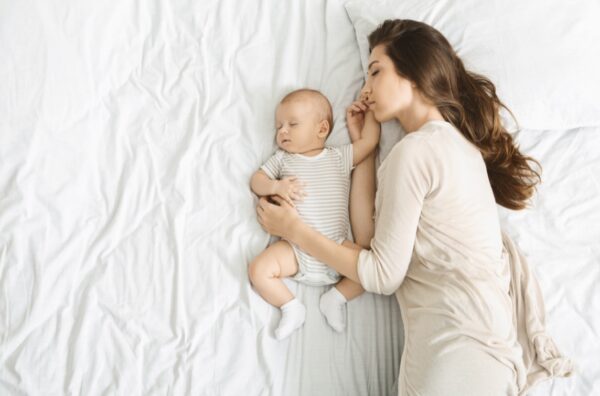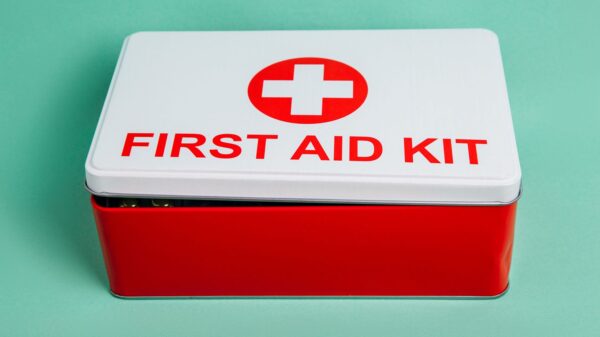
The Pros and Cons of Co-Sleeping with Your Baby

We would love to be cuddled up with our baby at all times and feel their heartbeat next to ours, but when it comes to the sleeping arrangements, we have to be wise.
Some parents prefer to co-sleep with their baby, while others wish to place their baby in a separate crib and even a separate room. Both sides of the coin have their pros and cons.
We have worked with leading UK baby brand, Nuby to explore the benefits and negatives of each to help you make the best decision for your baby.
What is co-sleeping?
Co-sleeping stands for sharing the same bed with your baby. There are different ways you can go about it. You can either share your family bed with your baby or your baby and your partner or put your baby in a crib or bassinet that attaches to the side of the bed. For that purpose, you can even get special sidebars or co-sleeping cribs.
While co-sleeping has its benefits and is a definite choice for some parents, it’s advisable that you start doing it after your baby turns six months. According to NCT, the safest place for your baby to sleep in the first six months is your room in a separate cot or bassinet.
Side A: The pros of co-sleeping with your baby
Many parents love the idea of sharing the same bed with their little one and being at an arm’s reach from them. The advocates of this practice feel more secure when doing so, as they can monitor their baby closely.
Co-sleeping with your baby allows for a more peaceful sleep for both the baby and the parents. The child feels more secure, thus waking up less throughout the night, while the parent makes fewer trips to the crib or the other room to comfort the baby.
It’s likely that your sleep patterns will synchronise with your baby’s, promoting a more peaceful sleep. If your baby is ill, you will be able to pay extra attention to them if co-sleeping.
There will be times when you will have to feed your baby throughout the night. If you’re sleeping in the same bed, this becomes easier. Just be mindful about falling asleep while sleeping and trapping and suffocating your baby. To stay awake, read that book you’ve been postponing for a long time!
By co-sleeping, you’re building a great sense of intimacy, thus strengthening your bond with your baby. Plus, there is no better feeling than waking up next to your smiling and charming little angel.
Side B: The cons of co-sleeping with your baby
Some parents and doctors, however, are firmly against co-sleeping due to the increased chance of Sudden Infant Death Syndrome (SIDS). Each year, around 200 babies die of SIDS in the UK, and the causes are unknown, although some underlying conditions can play a part. Babies born early and underweight, twins or multiple babies are at a higher risk.
Some believe that co-sleeping increases the chances of SIDS, because the baby can get strangulated or suffocated due to a lack of enough space. That’s especially true for young babies who lack enough motor skills to roll over or push away.
Co-sleeping can promote unhealthy dependency on the parents and increases the chances of the baby developing separation anxiety later on.
And while some mothers claim that they’re sleep has improved due to bed-sharing, others complain about sleep disruptions due to the constant or sudden movement of their child.
Safety tips for co-sleeping with your baby
If you decide to co-sleep with your baby, it’s important that you take certain precautions to ensure the safety of your child:
- Don’t co-sleep with your baby if you’ve consumed alcohol, drugs, sedatives, or are smoking. According to the Centers for Disease Control and Prevention (CDC) Trusted Source, the chances of SIDS increase for infants who have been exposed to second-hand smoke after birth.
- If the whole family is sleeping on the same bed, place baby next to you, rather than between you and your partner.
- Don’t co-sleep on a sofa or armchair, as the risk of SIDS is 50 times higher when doing so.
- Always place your baby on their back on a firm mattress to sleep, especially when swaddled.
- Make sure you remove all pillows, toys, and quilts from the bed that can cover your baby’s face, head, and neck.
- Dress your newborn in a sleeping bag for warmth and to ensure they’re not wiggling too much.
- If you have very long hair, tie it up when baby is sleeping to you, so they don’t get tangled in it.
- Make sure there are no spaces between the bed and the wall where your baby could get trapped.
- Avoid letting pets or other children into the bed at the same time.
There are many factors that come into play, and the decision should be based on what you believe is best and safe for your baby.














































